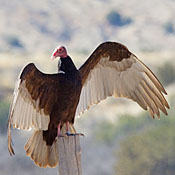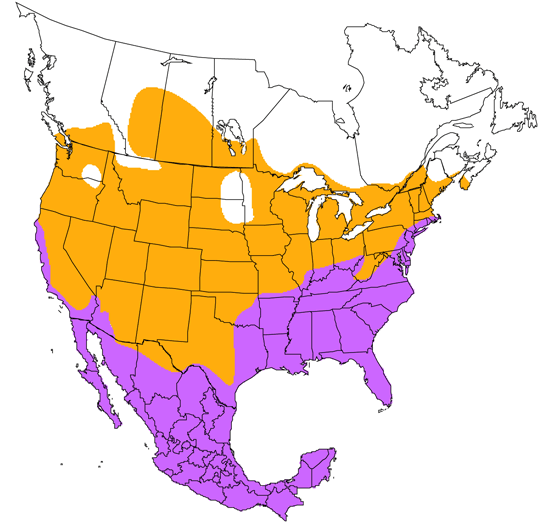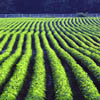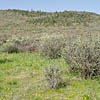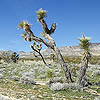Turkey Vulture
Cathartes aura

Hawk Like
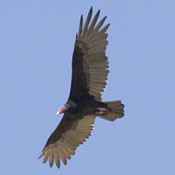
Length: 27 in. (69 cm )
Most often seen singly or in small groups soaring high overhead with wings set in a broad, open wing-span and tilting from side to side in the rising thermals, it occurs in a wide variety of habitats but mainly in open country. This vulture feeds only on dead carrion located largely by smell. The adults roost together in the same tree or cliff side each night. The nest is scraped onto a cliff ledge or mouth of a cave.
The four-digit banding code is TUVU.
Bibliographic details:
- Article: Turkey Vulture
- Author(s): Dr. Biology
- Publisher: Arizona State University School of Life Sciences Ask A Biologist
- Site name: ASU - Ask A Biologist
- Date published: 13 Jul, 2017
- Date accessed:
- Link: https://askabiologist.asu.edu/activities/bird/turkey-vulture
APA Style
Dr. Biology. (Thu, 07/13/2017 - 15:38). Turkey Vulture. ASU - Ask A Biologist. Retrieved from https://askabiologist.asu.edu/activities/bird/turkey-vulture
Chicago Manual of Style
Dr. Biology. "Turkey Vulture". ASU - Ask A Biologist. 13 Jul 2017. https://askabiologist.asu.edu/activities/bird/turkey-vulture
Dr. Biology. "Turkey Vulture". ASU - Ask A Biologist. 13 Jul 2017. ASU - Ask A Biologist, Web. https://askabiologist.asu.edu/activities/bird/turkey-vulture
MLA 2017 Style
Be Part of
Ask A Biologist
By volunteering, or simply sending us feedback on the site. Scientists, teachers, writers, illustrators, and translators are all important to the program. If you are interested in helping with the website we have a Volunteers page to get the process started.

